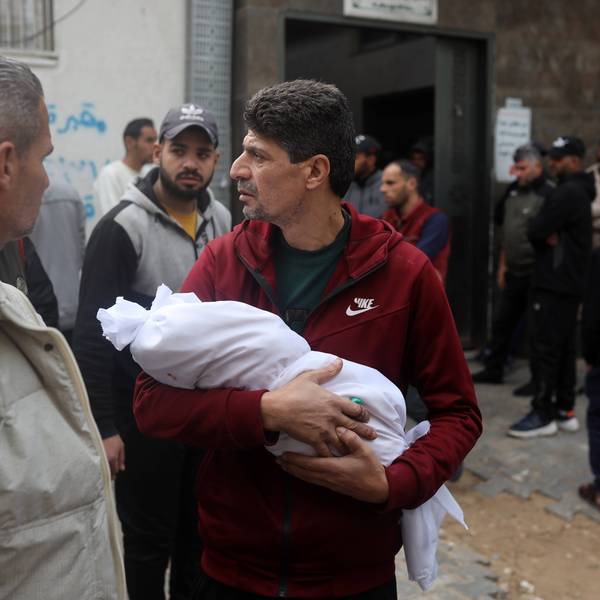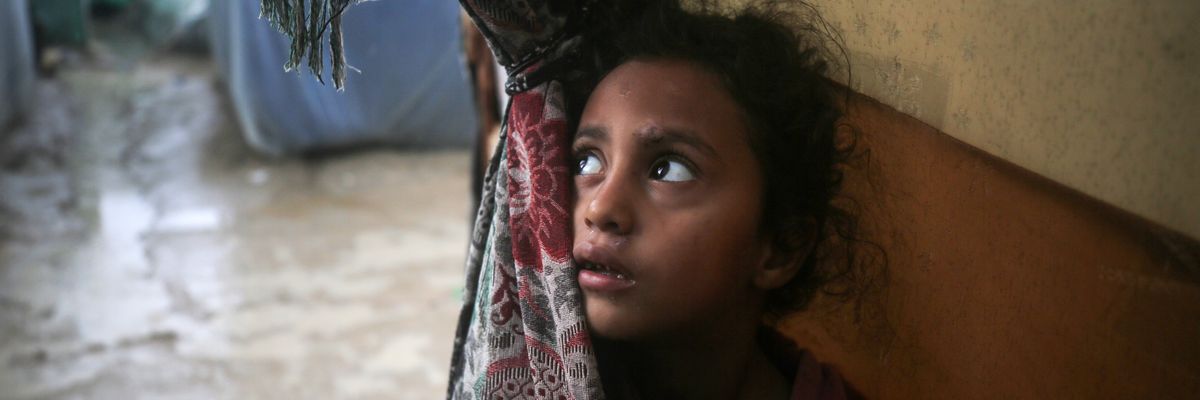Among the crises the U.S.-backed Israeli bombardment of Gaza has inflicted on the enclave's roughly 1 million children since October is a worsening shortage of safe drinking water, which the United Nations Children's Fund said Wednesday is posing an increasingly "dramatic" threat to children.
UNICEF warned that displaced people who have fled northern Gaza to the blockaded enclave's southern region, including Rafah, currently have access to just one and a half to two liters of water per day. Three liters of water for drinking are required daily for survival, according to the agency, and 15 liters are needed to meet cooking and sanitation needs.
Access to water for children across Gaza has been severely limited since Israel announced a "complete siege" on the enclave, which before the latest escalation was called an open-air prison by leading human rights groups. In retaliation for Hamas' attack on southern Israel on October 7, Israeli officials announced a blockade on food, water, and fuel deliveries, rendering water treatment plants inoperable and forcing families across Gaza to rely on water that has not been desalinated.
About 500 aid trucks entered Gaza daily through Egypt's Rafah crossing before the most recent violence, but only 100 per day have been permitted in since October.
Barry Andrews, an Irish member of European Parliament, recently shared a video on social media showing dozens of aid trucks that have not been allowed through the Rafah crossing.
"What we're looking at is an absolute travesty," said Andrews. "We've just been to the Rafah crossing and maybe one truck is getting through every hour."
In addition to the limited aid, for which the U.N. and humanitarian organizations are struggling to compensate, at least 50% of water, sanitation, and healthcare waste (WASH) facilities have been damaged or destroyed by Israel's air and ground assaults.
"We are doing everything we can to meet the needs of the people in Gaza, but the equipment and supplies we've managed to provide are far from enough," said UNICEF executive director Catherine Russell, who has also called for a "lasting humanitarian cease-fire" in Gaza.
"Access to sufficient amounts of clean water is a matter of life and death, and children in Gaza have barely a drop to drink," Russell said. "Children and their families are having to use water from unsafe sources that are highly salinated or polluted. Without safe water, many more children will die from deprivation and disease in the coming days."
Limited access to clean water has been linked to a sharp rise in waterborne illnesses in children. Cases of diarrhea—the second-leading cause of death among young children across the globe—have risen to almost 20 times the monthly average in Gaza among children under age five since the bombardment began. Between November 29 and December 10, cases jumped 66% to 59,895.
The spread of waterborne illnesses will further strain Gaza's collapsed healthcare system, which is also facing rising cases of chickenpox, meningitis, and respiratory infections.
UNICEF also described the dire circumstances humanitarian agencies are struggling to mitigate amid the water shortage at refugee camps and shelters across the Gaza Strip, where nearly the entire population of 2.3 million people is now displaced.
"In shelters across the Strip, long queues of exhausted women and children wait to use the, on average, one toilet for every 700 people, pushing people to resort to other coping strategies, such as the use of buckets, or open defecation," said the agency. "Showers are even less available reducing hygiene options to nearly non-existent, impacting especially women and girls. This could further lead to an increase in the spread of disease."
UNICEF said generators to operate water and sanitation facilities and materials for providing short-term repairs and building "rapid sanitation solutions" are available at the border crossing in Rafah, "but are unable to cross into Gaza due to access restrictions imposed on such supplies."
"The constant bombing, along with the restrictions on materials and fuel allowed into the territory, are preventing critical progress," said Russell. "We urgently need these supplies to repair damaged water systems."




